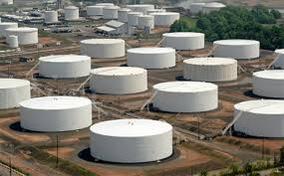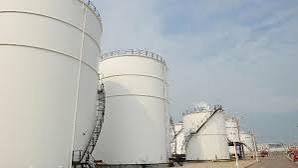
The fuel subsidy removal has crippled tank farm operations in Nigeria, leading to the closure of 70 out of 120 approved facilities. These dormant tanks, representing 65% of the total 120 approved facilities, are now idle, with operators increasingly bypassing their services in favor of alternative trucking options

business closure was primarily driven by the removal of the fuel subsidy by President Bola Tinubu’s administration, which led to a significant 488 per cent increase in petrol(fuel) prices and affected the purchasing power of fuel marketers.
A tank farm is an area used for the storage of oil and/or petrochemical products in large tanks and often installed in locations where marine tankers can discharge their products.
From the tank farm, petroleum products are distributed to end users or further storage facilities.
According to an engineering website, Plant Engineering, the purpose of tank farms is to provide a safe environment for storing chemicals.
Various raw materials such as gasoline, crude oil, liquefied natural gas, heavy oil, naphtha and other liquid chemicals are temporarily stored while they wait to be transported by ship, rail, tank truck or pipeline for further use or processing.
In Lagos State, these tank farms are widely spread in the Apapa, Ijegun, and Ojo axes, especially Satellite Town, a densely populated area.
Before the elimination of subsidy payments on refined products on May 29, 2023, by the current administration, tank farms served as a major economic necessity, as the country depended solely on fuel imports to meet its daily petroleum demands obligations.
The need to consistently meet this obligation and ensure energy security enticed many marketers to build storage farms to store refined products and guard against price fluctuations.
In 2024, the National Bureau of Statistics showed that the cost of petrol imports rose by 105.3 per cent to N15.42tn in 2024 from the N7.51tn recorded in 2023.
Our correspondent gathered that the proliferation of these storage facilities in 2012 and its attendant negative effects affected the livelihood of residents living in Ijegun.
READ:https://naijanewswatch.com/author/newswatch/
Reports 2023 highlighted complaints by residents as they lamented the environmental and social impact, making many relocate from the area.
It was also noted most tank farms had no parking bays, leading to road blockages by tankers and trucks and the dilapidation of road networks.
An analysis of functional tank farms using data from Petroleumprice.ng, which provides real-time petrol prices, revealed that there are over 120 storage facilities listed across Nigeria.
The document obtained on Tuesday revealed that out of over 120 depots listed across Nigeria, only about 50 farms, representing 45 per cent are functional, while 70 farms, representing 65 per cent are not closed and don’t have a single litre in their storage.
Checks showed that only 50 depots displayed real-time prices, product discharge details, quantity discharged, discharge date, and loading status, which serve as indicators of whether they are still operational.
A further breakdown revealed that the Lagos axis has about 30 functional depots, the Warri/Ogbara axis has 10, the Port Harcourt/Onne axis has six farms, and the Calabar axis has four storage facilities.
Further research on Petroleumprice.ng indicates that in 2025, key depots in each region lead in the regular inflow of products.
In the Lagos state, NIPCO, AITEO, RAINOIL, and A.A. Rano are prominent storage owners responsible for the regular inflow of PMS, AGO, and LPG. In the Warri axis, Matrix and AYM Shafa dominate with regular inflows of PMS, AGO, and LPG. In Port Harcourt, Bulk Strategic, SIGMUD, and Liquid Bulk lead in the inflow of PMS and AGO. In Calabar, Sobaz and Mainland are the primary leaders for PMS inflows.
Reacting, an oil and gas expert, Olatide Jeremiah, in a telephone conversation, affirmed that the functionality of tank farms across Nigeria has sharply declined.
According to him, this trend began after the removal of fuel subsidies and the full implementation of deregulation on May 29, 2023.
The expert said these changes caused a significant shift in the industry.
He said, “The decline in functionality of tank farms across Nigeria started on May 29, 2023, when the subsidy was removed and deregulation came into full effect; their capital base tripled, while profit dwindled.
“It became compounded in October 2024, when Dangote Refinery came into mainstream, plus the naira for crude policy, which gave Dangote Refinery an extraordinary competitive edge over oil importers and tank farm owners, leading to heavy bank debts; some shut down their depot, some placed



